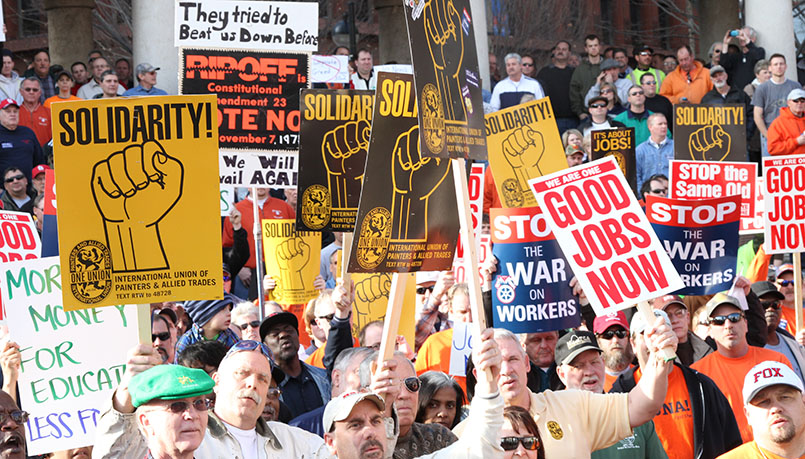
QGood day to you.
My reason for writing surrounds right-to-work doctine established in the NLRA of 1935.
I'm confused why some progressives are against having states adopt right-to-work environments. Please allow me to elucidate my thoughts.
There can be no dispute that labor unions in the early 20th century did some great things, like safety things addressed in OSHA, overtime laws, etc.
Lately, there are some states that wish to become right-to-work and there is strong opposition, largely from union personnel. The usual dialogue surrounds the fact that wages & benefits (among other things) are fought for and won by union folks and that members should be grateful.
Assuming this is true (and I'm not necessarily saying it is or is not), should it sell itself? If it's true, wouldn't union membership be chosen by workers whether compelled by law to do so or not?
This is a multi-faceted question then:
1. Why are unions so aggressive in forcing people to join (and pay dues) as a condition of work? I would postulate that either the benefits they claim to deliver aren't really true...or that they're doing a poor job selling it.
2. Why do you suppose, when given a choice, that more people are rejecting union membership?
In the interest of disclosure, I have, in the past, strongly identified with the Libertarian Party. With this latest administration, and all the craziness therein, I'm really questioning everything in the political arena. For what it's worth, I come here genuinely willing to have a discussion and hear your thoughts.
Thanks in advance for your consideration.
AThanks for writing in, and for a terrific question. As we see it, 'right-to-work' laws (like the one Missouri voters just rejected!) are part of a big business campaign to roll back the gains that workers have made by forming unions.
State right-to-work laws are authorized under the Taft-Hartley Act (1947), which amended the National Labor Relations Act (1935) to place new burdens on trade unions. ‘Right-to-work’ laws prohibit union security agreements—that is, contracts where employers and workers agree that new hires in a unionized workplace must join or contribute to the union as a condition of employment. Currently, union security agreements are outlawed in 28 states, and nationwide in the public sector (since the Supreme Court decision in Janus v. AFSCME earlier this summer).
To understand why union security matters, we have to understand what unions are and who they fight for.
A union is not some outside organization that swoops into a workplace and starts making rules and collecting dues. A union is a group of workers who organize themselves, elect leaders, and pool their resources to fight for their common interests.
Union security is important because organizing a union is hard. We’ve made progress since the days when employers would hire private security to murder union organizers, but workers still face intimidation, harassment, and anti-union PR campaigns when they try to form a union. Getting a union security agreement means that the union is built into the workplace. Regular income from dues and fair-share fees gives a union the ability to win and enforce better contracts.
It's also important to note that labor unions are not cartels, defending the narrow interests of their members above or against other workers. Both legally and as a matter of practical necessity, a union represents all workers in its bargaining unit, members and non-members alike. (Even in an open shop, where workers don’t have to join or contribute to the union, non-members don’t bargain independently with management).
Unions also fight for the rights of the entire working class. As you point out, a strong labor movement has been the key to winning things like workplace safety regulations, Social Security, and unemployment insurance. Union workers make well above minimum wage, but unions are among the strongest supporters of the movement to raise the minimum wage. Historically, organized labor has played a key role in promoting equality for women and African-Americans. (It’s worth noting, by comparison, that Southern segregationists were the earliest promoters of right-to work, because they feared that a racially integrated labor movement would undermine Jim Crow).
So, are people rejecting union membership? Not really. In fact, most workers never even get the chance to sign a union card or vote on union recognition in their workplace.
What appears as a decline in union density actually reflects an enormous shift in the economy. Forty years of offshoring and automation cost about half of our country’s manufacturing jobs, many of them union. At the same time, the service sector expanded rapidly, generating a whole bunch of new jobs that aren’t yet unionized, just as railroads and steel mills didn’t have unions in the early twentieth century. Organizing in the service sector has made real progress despite challenges like high turnover and reliance on freelance and temp workers—but we’re not where we need to be.
That’s why right-wing organizations are spending so much money to push right-to-work, both at the state level and nationally. (To put it in perspective, a single donor gave 28.5 million dollars to help keep a Supreme Court seat open for anti-union extremist Neil Gorsuch—more than the total dues contributed by all 25,000 members of the Chicago Teachers Union in a year.)
Despite all their talk about liberty, conservative billionaires aren’t pushing right-to-work out of a concern for workers’ rights. It’s part of a strategy to defund and demobilize organized labor, to make unions fight for their existence rather than for the social and economic advancement of the working class. They think that if they can weaken organized labor right now, they can remove the biggest obstacle to rampant economic inequality and unchecked corporate power.
Fundamentally, it isn’t a question of who has the right to work, but of who has the right to organize. Capitalism has always required the coordination of work on a large scale, collectivizing labor even as it privatizes profits. Employers organize us into workgroups, teams, shifts, sites, pay grades, supply chains--all for their benefit, and without any question of individual rights beyond the right to look for another job. In response, workers organize themselves into unions, pooling their resources in the fight for their common interests. Attacking union security through ‘right-to-work’ laws is about securing employers’ power over us by making it harder for us to organize ourselves.
Hope this helps, and thanks again for writing in.
P.S. Check out this report on the subject by Bea Lumpkin, who celebrated her 100th birthday on August 3. She signed her first union card in 1935 (the same year the NLRA was passed!) and has fought tirelessly for workers’ rights ever since.
Image: Missouri workers rally against right-to-work (2011). Photo by Jobs With Justice, under CC 2.o
State right-to-work laws are authorized under the Taft-Hartley Act (1947), which amended the National Labor Relations Act (1935) to place new burdens on trade unions. ‘Right-to-work’ laws prohibit union security agreements—that is, contracts where employers and workers agree that new hires in a unionized workplace must join or contribute to the union as a condition of employment. Currently, union security agreements are outlawed in 28 states, and nationwide in the public sector (since the Supreme Court decision in Janus v. AFSCME earlier this summer).
To understand why union security matters, we have to understand what unions are and who they fight for.
A union is not some outside organization that swoops into a workplace and starts making rules and collecting dues. A union is a group of workers who organize themselves, elect leaders, and pool their resources to fight for their common interests.
Union security is important because organizing a union is hard. We’ve made progress since the days when employers would hire private security to murder union organizers, but workers still face intimidation, harassment, and anti-union PR campaigns when they try to form a union. Getting a union security agreement means that the union is built into the workplace. Regular income from dues and fair-share fees gives a union the ability to win and enforce better contracts.
It's also important to note that labor unions are not cartels, defending the narrow interests of their members above or against other workers. Both legally and as a matter of practical necessity, a union represents all workers in its bargaining unit, members and non-members alike. (Even in an open shop, where workers don’t have to join or contribute to the union, non-members don’t bargain independently with management).
Unions also fight for the rights of the entire working class. As you point out, a strong labor movement has been the key to winning things like workplace safety regulations, Social Security, and unemployment insurance. Union workers make well above minimum wage, but unions are among the strongest supporters of the movement to raise the minimum wage. Historically, organized labor has played a key role in promoting equality for women and African-Americans. (It’s worth noting, by comparison, that Southern segregationists were the earliest promoters of right-to work, because they feared that a racially integrated labor movement would undermine Jim Crow).
So, are people rejecting union membership? Not really. In fact, most workers never even get the chance to sign a union card or vote on union recognition in their workplace.
What appears as a decline in union density actually reflects an enormous shift in the economy. Forty years of offshoring and automation cost about half of our country’s manufacturing jobs, many of them union. At the same time, the service sector expanded rapidly, generating a whole bunch of new jobs that aren’t yet unionized, just as railroads and steel mills didn’t have unions in the early twentieth century. Organizing in the service sector has made real progress despite challenges like high turnover and reliance on freelance and temp workers—but we’re not where we need to be.
That’s why right-wing organizations are spending so much money to push right-to-work, both at the state level and nationally. (To put it in perspective, a single donor gave 28.5 million dollars to help keep a Supreme Court seat open for anti-union extremist Neil Gorsuch—more than the total dues contributed by all 25,000 members of the Chicago Teachers Union in a year.)
Despite all their talk about liberty, conservative billionaires aren’t pushing right-to-work out of a concern for workers’ rights. It’s part of a strategy to defund and demobilize organized labor, to make unions fight for their existence rather than for the social and economic advancement of the working class. They think that if they can weaken organized labor right now, they can remove the biggest obstacle to rampant economic inequality and unchecked corporate power.
Fundamentally, it isn’t a question of who has the right to work, but of who has the right to organize. Capitalism has always required the coordination of work on a large scale, collectivizing labor even as it privatizes profits. Employers organize us into workgroups, teams, shifts, sites, pay grades, supply chains--all for their benefit, and without any question of individual rights beyond the right to look for another job. In response, workers organize themselves into unions, pooling their resources in the fight for their common interests. Attacking union security through ‘right-to-work’ laws is about securing employers’ power over us by making it harder for us to organize ourselves.
Hope this helps, and thanks again for writing in.
P.S. Check out this report on the subject by Bea Lumpkin, who celebrated her 100th birthday on August 3. She signed her first union card in 1935 (the same year the NLRA was passed!) and has fought tirelessly for workers’ rights ever since.
Image: Missouri workers rally against right-to-work (2011). Photo by Jobs With Justice, under CC 2.o




 Join Now
Join Now